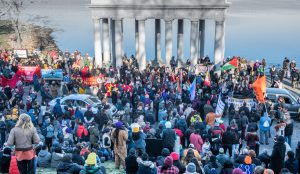Thanksgiving has always been a beloved holiday for many Americans, myself included. The crisp fall air, the colorful decorations, and of course, the delicious food shared with family and friends have made it a special time of year. As a child, I eagerly participated in Thanksgiving plays and art projects, reveling in the joy of the season.
However, as I grew older, I began to learn the dark truths behind the holiday. The revisionist history that painted a rosy picture of Pilgrims and Native Americans coming together in peace was shattered by the reality of genocide, theft, and oppression. I felt a sense of guilt for celebrating a holiday built on a foundation of lies.
This year, I had hoped to stand in solidarity with Indigenous people on a National Day of Mourning in Plymouth. Since 1970, Native Americans and their allies have gathered to honor the resilience of their people and protest the ongoing injustices they face. The contrast between the joy of Thanksgiving and the pain of this day of mourning highlighted the paradoxes of our world.
Due to unforeseen circumstances, I found myself celebrating Thanksgiving in Columbus, Ohio with my family instead. The mix of emotions I felt – gratitude for my loved ones, regret for not being in Plymouth – underscored the complexity of our history and the need to confront uncomfortable truths.
As we prepared for the traditional Thanksgiving feast, I couldn’t help but think of the Native peoples who once inhabited the lands we now call home. I felt compelled to acknowledge their presence and honor their legacy before indulging in the holiday festivities.
Some may argue that we should not let the past overshadow our traditions or tarnish our memories. They may prefer to remain willfully ignorant of the darker aspects of American history. But I believe that we cannot ignore our painful past if we are to move forward as a nation.
A recent visit to Harper’s Ferry National Park, where the specter of the Civil War looms large, reinforced this belief. The stark divisions that tore our country apart then are still evident today, as we grapple with issues of race, equality, and justice.
As we sit down to enjoy our Thanksgiving meal, I am reminded of the importance of acknowledging the painful truths of our past. We cannot change history, but we can learn from it and strive to create a better future for all. This Thanksgiving, let us remember the voices that have been silenced and the injustices that have been committed, and recommit ourselves to building a more just and equitable society for all. The ongoing battle for justice in America continues, with modern-day abolitionists fighting for equal rights for all while modern-day Confederates work to prevent that equality from becoming a reality.
As we made our way to Reagan International Airport, a stop at the Lincoln Memorial brought a stark reminder of America’s complicated history. The Gettysburg Address on the wall served as a poignant reminder of the nation’s founding ideals, juxtaposed against its dark legacy of white supremacy, Indigenous genocide, slavery, and colonization.
The concept that all individuals are created equal has been a cornerstone of American ideology, yet the country has struggled to fully realize this vision. The ongoing debate revolves around whether America can truly embrace equality for all, regardless of race, gender, nationality, ability, or any other defining characteristic.
Renowned Harvard physician Paul Farmer once said, “The idea that some lives matter less is the root of all that is wrong with the world,” a sentiment that resonates deeply with many. The entitlement of colonizers to oppress and exploit Native Americans, or of slave owners to dehumanize and exploit Black individuals, underscores the systemic injustices that continue to plague society.
The persistent struggle for equal rights highlights the deep divisions in American society, making it difficult to wholeheartedly celebrate historical events like the arrival of the Pilgrims at Plymouth Rock. The weight of ancestral sins, coupled with the challenge of reconciling personal identity with a complex cultural heritage, can evoke a range of emotions from shame to loss.
Amidst this turmoil, finding moments of joy and connection becomes crucial. Whether it’s gathering with loved ones from diverse backgrounds, engaging in meaningful conversations, or simply allowing space for different perspectives, fostering understanding and empathy is essential in navigating these tumultuous times.
As we navigate the complexities of our past and present, it’s important to embrace the full spectrum of emotions that arise. Whether it’s joy, melancholy, or a blend of both, allowing ourselves the freedom to feel and process our emotions authentically is key to fostering genuine connection and growth.
In the midst of uncertainty and divisiveness, may we all find moments of love, grace, and understanding. Let us come together with open hearts, share in the beauty of music and good food, and offer each other the gift of empathy and compassion as we navigate the challenges of our time.

